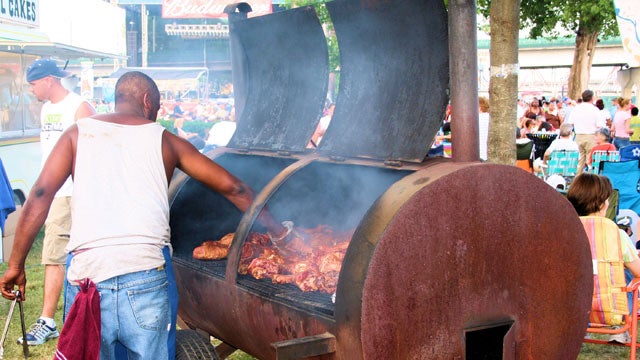RAMSHACKLE IS THE WORD 35-year-old filmmaker Joe York used to describe everything about his first documentary film shoot. In the spring of 2003, the 25-year-old University of Mississippi graduate student set off on a 10-hour drive, from Oxford, Mississippi, to Berea, Kentucky, in a silver 1992 Saturn SL2 with an odometer that had tired of ticking off miles at 220,000. In the backseat, York had thrown a Canon GL2 camera and a Sennheiser shotgun mic that he had rummaged out of boxes found in an Ole Miss AV room. He had little experience making a film, but figured his knowledge of how to tell a good story would suffice. He spent four days shooting, drove ten hours home, and looked at his nine hours of footage. ŌĆ£It was like that moment you return from the one-hour photo and realize you donŌĆÖt have anything,ŌĆØ he says.
Southern Folks
Five films by Joe York that helped raise the profile of lesser-known Southern food personalities.Culinary Quests
A few interactive guides from the Southern Foodways Alliance on where to find authentic Southern cuisine. ╠²York said his career path up to that point was a string of lucky lottery tickets. He grew up in Glencoe, Alabama, the son of a steel foreman and a world history teacher who told him to work at what he loved. After earning degrees in archeology and anthropology from Auburn University, he worked as the foreman on an archeological dig near Phenix City, Alabama. Eventually, he tired of digging up relics at a fort used during the War of 1812, and began to spend his free time searching backroads for the wildest Southern personalities he could find. He recorded and edited their oral histories, for fun. During a Google search, he came across the University of MississippiŌĆÖs Southern Studies program and knew immediately he wanted to attend. ŌĆ£So I filled out my application in the archeology lab at Auburn and mailed it on my lunch break from the fort the day before it was due,ŌĆØ he said.
He got in and met John T. Edge, the director of the , a division of the school that profiled southern food personalities. York put a bug in EdgeŌĆÖs ear. He wanted to shoot films to go with the organizationŌĆÖs oral histories. In 2003, Edge received enough money from ŌĆöthe son of RuthŌĆÖs Chris Steak House founder Ruth FertelŌĆöto commission a film to honor the organizationŌĆÖs Keeper of the Flame Award. The recipient was , a farmer from Kentucky who preserved heirloom bean and tomato seeds that had passed down through his family for generations. Edge knew YorkŌĆÖs filmmaking skill was more rattletrap than his car, but asked him to drive to Kentucky anyway. ŌĆ£He wanted it bad,ŌĆØ Edge said. ŌĆ£We made decisions based on gut, smarts, and heart.ŌĆØ
When York returned to Oxford with only crappy footage, he was at a crossroads. He could throw together a sub-par short on Best, or he could call the seed saver and ask for another chance. He picked up the phone and expected to be laughed at or rejected. ŌĆ£In a lot of ways, it couldnŌĆÖt have been a better scenario, because I canŌĆÖt imagine anybody being nicer about that than Best was,ŌĆØ said York. ŌĆ£He was just like, ŌĆśOh man, if thatŌĆÖs just what you need to do, just come on up and do it.ŌĆÖŌĆØ
More than 70,000 miles, three cars, and more than 30╠² later, York is still profiling people for the Southern Foodways Alliance. Though most popular films about food profile celebrity chefs or highlight dubious industry practices, YorkŌĆÖs art is a celebratory activism of lesser-known experts. HeŌĆÖs a one-man, egoless show: pushing his lens into barbecue spits and farmersŌĆÖ mugs, shooting interviews,╠²and editing his voice out as much as possible. He gets a contact high being next to people who are so passionate about food, and wants viewers to feel the same.
ŌĆ£Hopefully, they get to experience it in the way that I experience it,ŌĆØ he said. ŌĆ£Which is, most of the time, peering in the seat next to the person in the car, being right there in the field so it feels like youŌĆÖre walking along with them, or riding along with them.ŌĆØ
We caught up with York by phone during some rare downtime in Oxford, Mississippi.
When did you get interested in food?
I never in my life thought that the defining aspect of my career so far would be making films about food. But once you get out there, you realize that there may be no better way to get people to open up and talk about themselvesŌĆöwhat they really like and what their lives are likeŌĆöthan to get them to start talking about food. I mean, people just really open up about that topic.
Why do you think people open up?
Food is indelibly linked to the best memories we have in lifeŌĆöand the saddest memories. Especially in the South, food is tied to who you are and where you're from because it is kind of the major supporting character in every scene of your life.
I╠²╠²suddenly╠²this year at age 40. So many of his poems have to with these allusions to food, or what people were eating, or what certain tastes were.
Every year for my family reunion we would cook a whole hog together. That will always be part of my memory of my brother. Every time I have barbecue, every time I cook a pig with somebody, every time I light a big stack of hickory on fire, IŌĆÖll always think of him.╠²
Other foods, other tastes, work that way for everyone. Food is an incredibly evocative part of peopleŌĆÖs lives. When they start talking about it, they start talking about everything else at the same time.
What are some of the difficult subjects you wouldnŌĆÖt otherwise feel comfortable talking about?
Race is one of themŌĆönot just in the South, but everywhere in the U.S. ItŌĆÖs not something that youŌĆÖre going to walk up to somebody and just say, ŌĆ£Hey, you know what. LetŌĆÖs talk about race.ŌĆØ╠²
But you talk to about why she cooks, and she starts talking about growing up in Montgomery and how her mom would take her to the meetings at the churches as they were getting ready to plan the bus boycott or the marches, learning to cook from these older ladies who were cooking sandwiches for the marchers from Selma to Montgomery.
They had to cook for these folks, because nobody else was going to give them something to eat because they werenŌĆÖt going to find a place where they were welcome around the roadside. So they had to carry sandwiches out to them.╠²
Suddenly a ham sandwich becomes a symbol of their love for these people who were doing the incredibly hard work of trying to gain equality for African Americans in Alabama in the sixties.╠²
How do you find people to talk to?
The Southern Foodways Alliance has about 1300 or 1400 members, but I also just meet people by chance.
I met a guy in Louisiana on the side of the road. I just ended up spending all day at his house because I was a huge fan of his cochon de lait. When I was driving down to Louisiana, the Mississippi river was flooding. I was going down this old rural road, and the river was coming up awful, and all the tributaries were flooded, and there were all of these deer that had been washed out of their stomping grounds. I stopped on the side of the road and just sat on my car and looked at these deer. Here comes this other guy. I had my camera out and he asked me if I was with the news. And I told him I was looking for folks that were doing ŌĆöcooking these suckling pigs. And he said, ŌĆ£Well, weŌĆÖre cooking one Sunday if you want to come by the house.ŌĆØ
So he gave me his phone number, I called him on Saturday, went over there early on Sunday morning, and spent the day with this family. It's all happy accidents.
WhatŌĆÖs the toughest story youŌĆÖve ever shot?
We did one on Apalachicola where the fella I wanted to talk to just wasnŌĆÖt into being on camera. He said yes. Then I went down there and he was like, I donŌĆÖt know. Every day I went down there and he said, ŌĆ£No.ŌĆØ And IŌĆÖd say, ŌĆ£OK, IŌĆÖll come back tomorrow and see if you want to do it then.ŌĆØ In the meantime I would go and ask some of the oystermen if I could muck around on their boat with them. I had a day to kill, so IŌĆÖd just go ride around on the boat with them and document these guys doing what they do. That was one that ended up not being about the guy I went down to interview. It was called . It ended up being about a husband and wife. The guy was an oyster tonger, and his wife was an oyster shucker.
So much of whatŌĆÖs good in finding your footage are these kind of asides that you may not have been looking for at first.╠²
Other than that, itŌĆÖs been incredibly easy to do because most of the folks I talk to understand that what theyŌĆÖre doing is important and unusual. Generally speaking, they are very happy to have someone come to talk to them about it and tell their story.
Considering all of the ways that people have let you inŌĆöyouŌĆÖve spent a lot of time with people in pretty intimate circumstancesŌĆöwhatŌĆÖs the strangest thing youŌĆÖve come across?
ThereŌĆÖs some stuff that people show you, that you have on film, that you donŌĆÖt share. For example, I was in Louisiana, and they have this absurd rite of passage. I was at this guyŌĆÖs place and he was killing a pig. He was getting ready to butcher it and make boudin. So he killed the pig and he was like, ŌĆ£Hey, do you want me to show you how we measure the tail?ŌĆØ So he calls his little nephew over and says, ŌĆ£OK, weŌĆÖre going to teach you how to measure the tail.ŌĆØ
He gets the kidŌĆÖs hand and he says, ŌĆ£You gotta hold your hand still just like that and hold your finger out real straight.”
He pulls the tail out next to the kidŌĆÖs finger. The kid is really intent, really into doing this important thing. So he gets the tail pulled out, makes sure the finger is all straight, and then, boom, he pops the kid in the elbow.
The kidŌĆÖs finger goes right up the pigŌĆÖs ass and they all laugh. ItŌĆÖs this hilarious Cajun rite of passage. All of the people that are there have had that joke played on them at one time or another. So itŌĆÖs just hilarious. The kid even thought it was funny. But if I show that on film, that just looks weird. Out of context, itŌĆÖs just knocking a kidŌĆÖs finger up a pigŌĆÖs ass, you know? Maybe weŌĆÖll hold off on that.╠²
And do you have a short that you are most proud of?
I almost canŌĆÖt watch it anymore because of the technical screw-ups, but still, has to be the one. We shot it and it wasnŌĆÖt good and then we went back and redid it. If I had left it where it was and tried to make something of it, I donŌĆÖt know that I would have stayed in filmmaking. On that project, I learned to do it right.
The main thing is just making sure that you do justice to the people that you are filming, that you tell a good story, and that if you screw up, youŌĆÖre not too proud to turn around and do it again.
A film by Joe York about the heart and soul of Southern Food.


